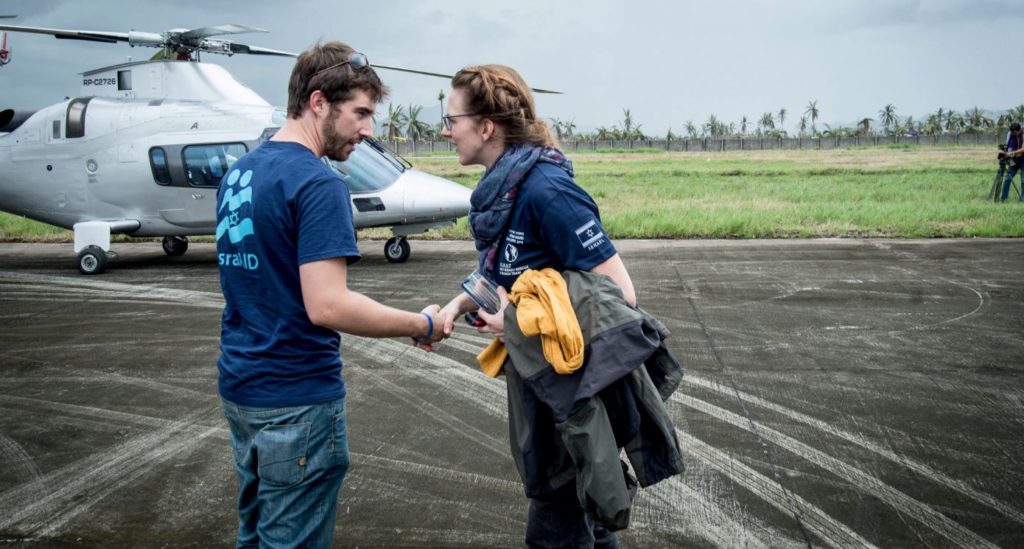TEL AVIV – When you see photos of disaster workers at the scene, you probably think they’re exhausted and hard-working, and they are. But that’s not all.
Israeli Navonel Glick is also inspired. He’s lifted up by the people he arrives to rescue.
Glick is the 29-year-old chief operating officer of IsraAID, a Tel Aviv non-profit that shows up at natural disasters just as others are fleeing.
It’s constant. In August of 2014 they were distributing blankets and other emergency supplies to Yazidi communities fleeing ISIS in refugee camps in the Kurdistan Region of Iraq. Later that year, they were responding to the Carlton Complex Wildfire in Washington State. The organization has grown five-fold in the past 3 years, now with about 150 workers worldwide in 20 countries.

A Nepalese woman carries her new beekeeping kit home after training. Submitted photo.
Glick, who has led disaster-response missions, has been selected for an international award, after his nomination by Milwaukee Jewish Federation.
He turns philosophical when asked in a Skype interview to explore how he feels about working for IsraAID.
“Disasters have a way of knocking out social order and knocking out everything we know … in the most extreme and aggressive way,” he said. “We’re left naked … even physically.”
“I think for me I’m often very inspired and end up really believing in the world, having faith in the world when I go to places of extreme difficulty and challenge and find people that … live for something else and see the impermanence and fragility of this world, and still go on.”
Glick remembers one time, arriving in Tacloban, Philippines a few days after the city was devastated by Typhoon Haiyan in 2013, there were still bodies lining the streets. “I remember as we arrived in Ormock (another city there), as you entered, as you entered the neighborhood of the City Hall, you saw the big banner where it says, ‘Roofless, homeless, but I’m not hopeless.’”

These Nepalese women have been taught to make honey, so that they can provide for their families. In this photo, they’re holding up certificates after completing the training course. Submitted photo.
Another sign spotted: “Tomorrow will be better than today.”
“Despite it all, life goes on and we will celebrate it,” he says. “That is so important.”
He also remembers a support group for Ebola survivors facing stigma. He noted their “enjoyment of life,” despite having faced “the unfacable.”
A sweet new year
Glick used to spend more time in the field, but serving as chief operating officer for a year now, he manages the day-to-day operations of an organization with a $5 million budget. His current work has him spending less time with survivors and more time with his computer. He’s evaluating projects, ensuring high standards and building a growing organizational structure.
“Frankly I think a lot of my job is to make sure that the staff don’t run themselves in the ground,” he added. “It’s always important to understand what we can and cannot do.”

These jars of honey produced by the IrsraAid HoneyAid are to be sold in Kathmandu. The strain of honey is unique to the Himalayas. Submitted photo.
Glick says IsraAID really hasn’t had problems from serving people in the Arab world or elsewhere. People don’t refuse to be helped by Israelis. On the contrary, he said, people of all faiths work for IsraAID, they arrive “as individuals,” and people seem to appreciate help from a tiny country that’s respected for building itself up.
In recent weeks, IsraAID has seen some sweet success in Nepal, teaching 250 women how to support themselves through honey production. The April 2015 earthquake there killed several thousand people, flattened whole villages and left hundreds of thousands of people homeless. It also left many people without a way to support themselves.
“They’re being trained in honey production and beekeeping so that they can feed their families, stay in their villages where they are protected and build a better future,” Glick said.
IsraAID relief workers brought some honey back from their Nepal trainees so that Glick and others could taste it for themselves. It makes Glick think of the sweetness of Rosh Hashanah coming soon. The honey tastes “amazing,” he said. Hundreds more women are starting training next.
“The biggest question always is, what happens when I’m gone?”
The answer, at least for some women in Nepal, looks like it could be beekeeping and honey production.
* * *
How to help
IsraAID invites people to sign up to volunteer their time. Fill out a form online to register your availability. Please understand that you may not receive an immediate reply because of IsraAID’s limited staff and the nature of its work.
You can also donate online. Or follow their Facebook page to help create awareness.
Visit Israaid.co.il.



